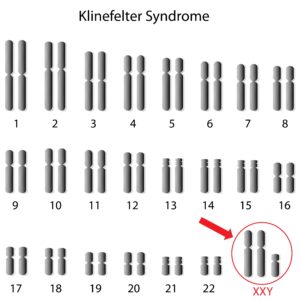© 2018, GENASSIST, Inc.
By Keith S. Wexler, MBA, Maternal Feta Medicine, Prenatal Diagnosis and Biotech/Life Sciences Consultant, GENASSIST, Inc.
Paul Wexler, M.D., F.A.C.O.G., Medical Director, GENASSIST, Inc.
Clinical Professor, Department of OB/GYN, University of Colorado Health Sciences Center
Clinical Professor, Division of Genetics/Dept. of Pediatrics, Univ. of Colorado/The Children’s Hospital
47,XXY (Klinefelter Syndrome) is characterized by two X chromosomes and one Y chromosome in males instead of the expected one X and one Y chromosome.
Maternal Fetal DNA testing is Not absolutely diagnostic and testing does Not distinguish mosaicism.
Approximately 80% of male fetuses with a 47,XXY male karyotype show no mosaicism and 20% of males with 47,XXY demonstrate mosaicism.
The finding of normal cells with a 46,XY karyotype in addition to 47,XXY cells might reduce the impact of the 47,XXY karyotype but is not assured to do so.
The incidence of 47,XXY males in the general population is approximately 1:500 to 1:1000 live births.
47,XXY (Klinefelter Syndrome) males may show:
- Accelerated height beginning at approximately 5-6 years of age with an average adult height of 6’3”
- Problems with behavior and anger management
- Mild developmental delay, although often intelligence is normal
- Acne
- Small testes
- Decreased fertility with decreased or absent sperm
- Gynecomastia (breast development) at puberty (10-12% of children)
- Less muscular development
- Decreased facial hair
Testosterone therapy may be recommended.
Spontaneous pregnancies and pregnancies achieved with assisted reproductive technologies are possible especially with males with mosaicism.
Sperm numbers have been reported to decrease with age and possibly testosterone.
